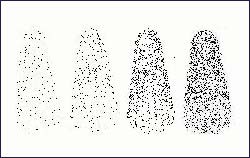Power and Electrical Engineering
This topic covers issues related to energy generation, conversion, transportation and consumption and how the industry is addressing the challenge of energy efficiency in general.
innovations-report provides in-depth and informative reports and articles on subjects ranging from wind energy, fuel cell technology, solar energy, geothermal energy, petroleum, gas, nuclear engineering, alternative energy and energy efficiency to fusion, hydrogen and superconductor technologies.

To see the message, just add noise
USC nanotube device uses ’Stochastic Resonance’ to enhance subthreshold signals
Paradoxical as it seems, a team of University of Southern California researchers has built a signal detector that only works when noise is added.
The device uses a novel kind of transistor made from carbon nanotubes. The principal investigator, Professor Bart Kosko of the USC department of electrical engineering, claims that the series of experiments reported in the December issue of the American

Scientists decode DNA of bacterium that cleans up uranium contamination and generates electricity
Department of Energy-funded researchers have decoded and analyzed the genome of a bacterium with the potential to bioremediate radioactive metals and generate electricity. In an article published in the December 12th issue of Science, researchers at The Institute for Genomic Research (TIGR) and the University of Massachusetts, Amherst, report that Geobacter sulfurreducens possesses extraordinary capabilities to transport electrons and “reduce” metal ions as part of its energy-generating metabolism.

Gas Hydrates – Will they be considered in the future global energy mix?
For the first time, an international research program involving the Department of the Interior’s U.S. Geological Survey has proven that it is technically feasible to produce gas from gas hydrates. Gas hydrates are a naturally occurring “ice-like” combination of natural gas and water that have the potential to be a significant new source of energy from the world’s oceans and polar regions.
Today at a symposium in Japan, the successful results of the first modern, fully integrated p

Research generates reliable energy source during outages
As utility companies search for ways to avoid blackouts, like the one that shut down the northeastern corner of the United States last summer, one idea comes from the University of Wisconsin-Madison.
Researchers from the College of Engineering have designed a system where a small network of local generators can reliably disconnect from the rest of the power supply, enabling locations where electricity is critical to stay in operation.
Most buildings receive their electrical power

Solving the problems of electric motors run from power converters
In this PhD thesis, Eugenio Gubía proposed a solution for the problems of electric motors run from power converters. Controlling motors and electric generators by means of power converters has negative effects with the presence of overtvoltages and high-frequency currents throughout the installation. These effects accelerate the ageing process of the motors and, moreover, can provoke faults in the correct operating of the control circuits.
Thus, in his PhD, Mr Gubia has developed a generic m

Solar energy: Europe aims to lead the world in Photovoltaic technologies
The recently created “Photovoltaics Technology Research Advisory Council” will meet for the first time on 4 December 2003 in Brussels. The initiative of the European Commission involves 18 members representing all the major players in this technology.
Europe is now the world’s second largest manufacturer of photovoltaics, accounting for more than 24% of overall production, behind Japan (44%) and ahead of the USA (22%). Current forecasts show large potential for solar electricity produc